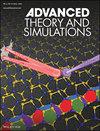Machine Learning for Sulfide Stress Cracking Prediction
IF 2.9
4区 工程技术
Q1 MULTIDISCIPLINARY SCIENCES
引用次数: 0
Abstract
Stress Corrosion Cracking (SCC) poses a significant threat to production systems, arising from the interaction of tensile stresses and corrosive environments. Sulfide Stress Cracking (SSC), particularly associated with hydrogen sulfide (H硫化物应力开裂预测的机器学习
应力腐蚀开裂(SCC)是由拉应力和腐蚀环境相互作用引起的,对生产系统构成重大威胁。硫化物应力开裂(SSC),特别是与硫化氢(H2S)气体有关,与油气生产密切相关。双相不锈钢(DSS)等耐腐蚀合金有助于缓解这一问题。然而,了解环境条件和载荷对DSS中SSC的影响仍然具有挑战性。现有的标准缺乏对具体环境因素的洞察。使用基于物理的方法建模SSC是计算密集型的。为了解决这个问题,开发了一种新的机器学习(ML)框架,利用基于决策树的模型和概率图模型(贝叶斯网络,BN)。DSS的数据集是从已发表的文献中整理出来的,并且使用先进的数据整理方法来解决数据不平衡问题。该框架旨在揭示驱动DSS中SSC的复杂因素,为油气行业提供准确的预测工具。
本文章由计算机程序翻译,如有差异,请以英文原文为准。
求助全文
约1分钟内获得全文
求助全文
来源期刊

Advanced Theory and Simulations
Multidisciplinary-Multidisciplinary
CiteScore
5.50
自引率
3.00%
发文量
221
期刊介绍:
Advanced Theory and Simulations is an interdisciplinary, international, English-language journal that publishes high-quality scientific results focusing on the development and application of theoretical methods, modeling and simulation approaches in all natural science and medicine areas, including:
materials, chemistry, condensed matter physics
engineering, energy
life science, biology, medicine
atmospheric/environmental science, climate science
planetary science, astronomy, cosmology
method development, numerical methods, statistics
 求助内容:
求助内容: 应助结果提醒方式:
应助结果提醒方式:


